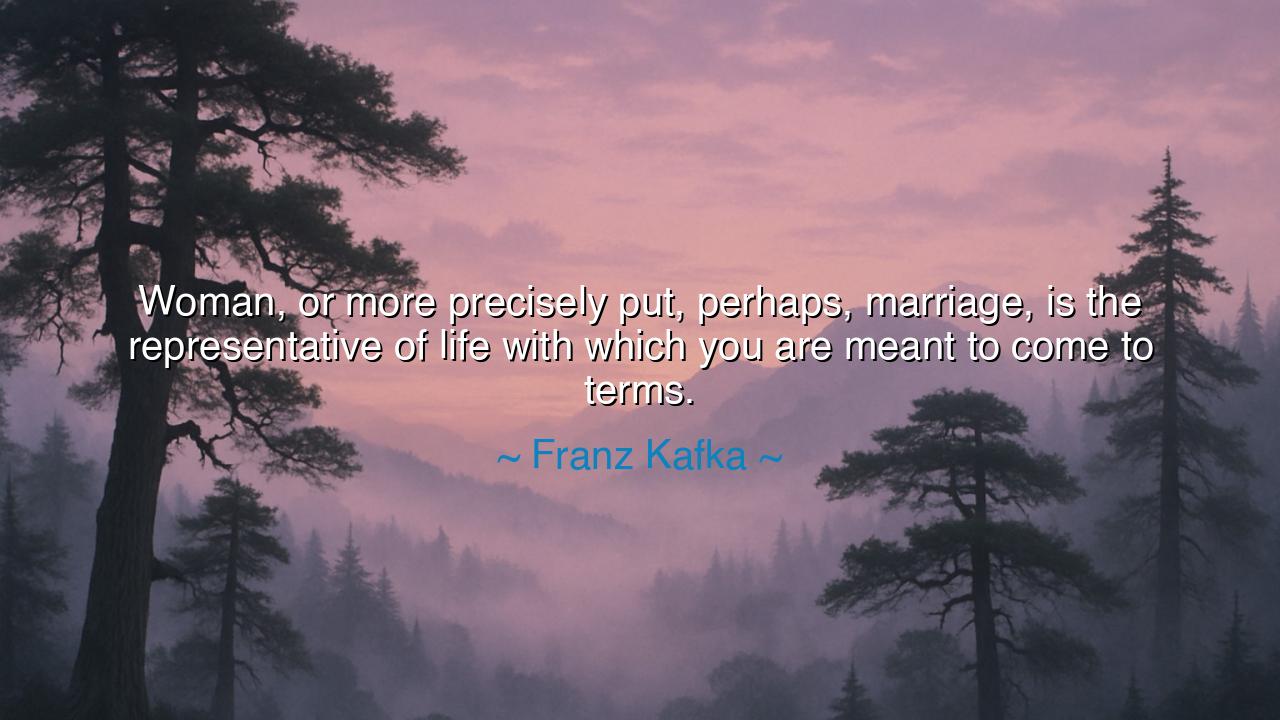
Woman, or more precisely put, perhaps, marriage, is the
Woman, or more precisely put, perhaps, marriage, is the representative of life with which you are meant to come to terms.






Come close, O seekers of truth and understanding, for I bring words that carry the weight of wisdom and the timeless struggles of the human heart. The great Franz Kafka, whose works have haunted the minds of many, once spoke thus: "Woman, or more precisely put, perhaps, marriage, is the representative of life with which you are meant to come to terms." These words, simple yet profound, speak of the deep and often unsettling relationship between the individual and the world around them—an eternal battle between desire, commitment, and the inevitable truths we must face.
What does Kafka mean, O children, when he says that marriage is the "representative" of life? He speaks of the commitment that binds us to another, the act of merging one’s existence with another's, and the responsibilities that come with it. Marriage, in this sense, is not merely a union of two bodies, but a mirror of the very nature of life itself—a journey of mutual sacrifice, growth, struggle, and, yes, even conflict. To come to terms with marriage is to come to terms with the inherent complexity of life. It is a path that brings both joy and sorrow, both unity and separation, for in marriage, as in life, we are constantly faced with the need to reconcile our own desires with the reality of the world around us.
Reflect upon the tale of Odysseus and his return home to Penelope. For Odysseus, marriage to Penelope was not just a symbol of love, but of the very trials he must face to find his way back to peace and wholeness. His long journey was filled with temptations, distractions, and doubts, yet he remained faithful to the idea of returning home, not just to his kingdom, but to the balance and commitment that Penelope represented. Penelope, in turn, faced her own struggles, resisting suitors and holding fast to the belief that her husband would return, that marriage was not just an external bond, but an internal call to faithfulness and resilience. This ancient story speaks to the same struggle Kafka references—one’s relationship to marriage is symbolic of the larger struggle to come to terms with the complexities of life itself.
And yet, in the words of Kafka, there is a darker layer to this insight. Marriage, like life, is not always a straightforward journey. It is full of conflict, disillusionment, and often a painful awareness of one’s own imperfections. To come to terms with marriage, then, is not just to understand the joy of union, but the sacrifice and the acceptance of the parts of ourselves we cannot change, and the difficult truths about the person we have chosen to share our life with. It is the realization that we must sometimes compromise our deepest desires for the sake of relationship and growth.
Consider the life of Virginia Woolf, whose struggles with marriage were profound and heartbreaking. Her union with Leonard Woolf was built on intellectual camaraderie and love, yet it was marred by her internal struggles and the weight of her mental illness. Virginia Woolf did not find marriage to be a simple path to happiness, but rather, a complicated and often painful reflection of her own battles with self-worth, identity, and the constraints of society. Leonard, ever the devoted husband, became both a pillar and a source of frustration for Virginia, as she grappled with her need for both independence and connection. Her marriage, like life, was a series of contradictions—love, support, and yet struggle. Her journey, though tragic in its complexity, shows us that the task of coming to terms with marriage is a deeply personal one, and it mirrors the larger task of coming to terms with our place in the world.
From this, we learn that marriage, like life, is not something that can be fully understood in moments of clarity, but something that unfolds slowly over time, in the spaces between joy and sorrow. Kafka’s words remind us that we must not only face marriage as a social contract or an idealized union, but as a reflection of the larger truths of life. It is an ongoing challenge—a process of growth, acceptance, and ultimately, reconciliation with the world as it is, not as we wish it to be.
Thus, O children of the earth, take heed of these lessons: To come to terms with marriage is to come to terms with life itself. It is a path that is not always clear, but always worthwhile. Let marriage not be a mere escape from the struggles of life, but a means to face them head-on, together. Commitment is not the end of the journey, but the beginning of a deeper understanding of ourselves and the world around us. The lessons you learn in marriage, in relationship, and in love are the same lessons that will guide you through the greater adventure of life. And in this, you will find not only growth but a profound peace—a peace that comes from the courage to face the complexities of life with honesty, bravery, and faith.






AAdministratorAdministrator
Welcome, honored guests. Please leave a comment, we will respond soon